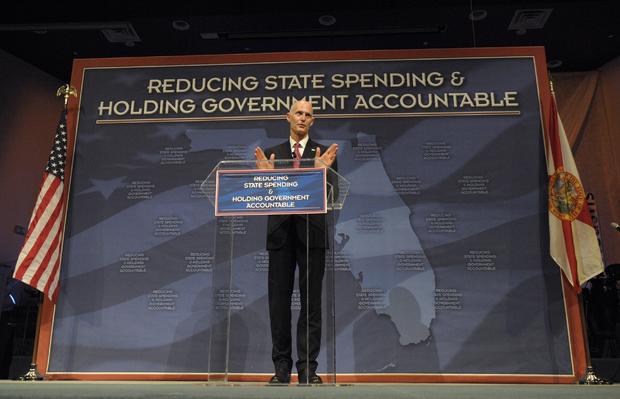Rick Scott Faces Backlash from Democrats, Republicans for Rejecting High Speed Rail Money for Florida
Both Democrats and Republicans from Florida are balking at Florida Gov. Rick Scott's decision to reject $2.4 billion in federal aid to build a high-speed train line between Orlando and Tampa -- and one senator is even trying to completely bypass the Republican governor's opposition to the project.
Democratic Sen. Bill Nelson spoke with U.S. Transportation Secretary Ray Lahood today about financing the Tampa-Orlando rail line without the state government's involvement, the Palm Beach Post reports.
"We are exploring... how we could keep this project going forward since the state of Florida will not participate," Nelson told the Post. "We have the lawyers researching it."
Scott announced earlier today that he was rejecting the money because he believed the state could be on the hook for as much as $3 billion in cost overruns. Additionally, he said he was skeptical ridership would pay for the line's operating costs.
Nelson said earlier today that rejecting the federal investment amounted to "turning down 24,000 jobs, when we badly need them," the Miami Herald reports.
Republican Rep. John L. Mica, chairman of the House Transportation and Infrastructure Committee, called the decision "a huge setback for the state of Florida, our transportation, economic development and important tourism industry."
The governor's decision is a significant snub at the Obama administration, which recently unveiled a major plan to spend $53 billion over six years on developing high speed rail lines across the country. White House Press Secretary Jay Carney said today that the administration believes high speed rail projects will help create jobs and create the infrastructure "that allows us to compete in the 21st century."
Other countries are already advanced when it comes to high speed rail, Carney said. "We need to be."
LaHood said in a statement today that his department is "extremely disappointed" by Scott's decision. And in fact, LaHood said, his department had worked with Scott to ensure that private businesses competing for the project would assume the cost overruns and operating expenses -- not the state.
The U.S. Conference of Mayors released an analysis suggesting the rail line could have provided up to $2.9 billion in economic benefits in the Orlando area alone, creating as many as 27,500 jobs, Time magazine reports.
Democratic Rep. Kathy Castor of Tampa blasted Scott for "a devastating lack of vision for Florida and a lack of understanding of our economic situation," The Tampa Tribune reports.
"The governor put his own rigid ideology ahead of the best interests of Florida's businesses, workers and families," she said. "Our neighbors in Tampa Bay and Central Florida will be condemned to I-4 traffic jams in the decades ahead with little hope for economic growth, unless the governor reconsiders."
Republican C.C. "Doc" Dockery, former chairman of the Florida High Speed Rail Commission, told the Tampa Tribune that today was "a great day for the citizens of California, who will be getting billions of dollars that Florida didn't want and the thousands of jobs that come with the money."
Dockery blamed the Tea Party for the decision. Indeed, the Miami Herald reports that Scott announced his decision after meeting with tea partiers in his office who urged him to reject the federal funding.
Scott is the third conservative governor to reject the federal rail money, following Ohio Gov. John Kasich and Wisconsin Gov. Scott Walker. However, the $2.4 billion Florida was slated to receive from the federal government is much more than Ohio and Wisconsin expected to get.
Not all Florida lawmakers responded negatively to Scott's decision.
Republican Florida House Speaker Dean Cannon said in a statement he is "encouraged [Scott] is focusing on the practical realities of government programs and their long-term impacts. As the constitutional officer charged with carrying out transportation policy, the governor seems to have determined that at this time he cannot feasibly implement high-speed rail in Florida. I have confidence that he will bring the same level of scrutiny to other issues."

